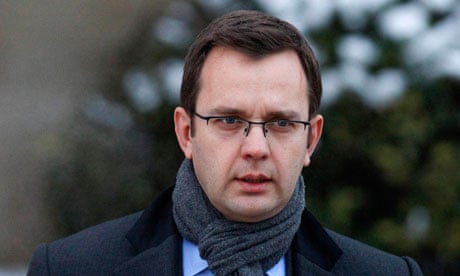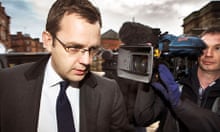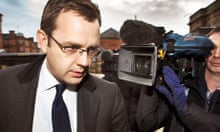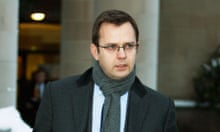The Metropolitan police have moved to close off the supply of information which could identify senior journalists at the News of the World who commissioned illegal phone hacking.
In a change of policy which has significant implications for the prime minister's media adviser, Andy Coulson, who used to edit the paper, police have said they will no longer provide all public figures with a summary of potentially relevant phone-hacking evidence in their possession.
The move relates to a mass of paperwork, computer records and audio tapes that police seized from the paper's private investigator, Glenn Mulcaire, in August 2006.
This material is believed to include the names of senior journalists who worked for Coulson and who instructed Mulcaire to target named public figures including politicians, sports personalities and showbusiness figures.
Police now admit privately that they failed to fully analyse this material during their original inquiry.
More recently, they have refused repeatedly to go back and investigate it and, when judges have ordered them to release particular portions of the material for court cases, they have blacked out large sections, including most of the references to the journalists who instructed Mulcaire.
However, until now, they have been willing to give public figures who contacted them a brief summary of references to them in the seized material.
According to Scotland Yard, 194 people have contacted them for these summaries since last July when the Guardian revealed the scale of phone hacking at the News of the World.
Scotland Yard has now changed its policy and their lawyers are replying to requests from public figures by telling them that they will hand over a summary of the material that was held on them by Mulcaire only if the public figure can persuade them that there are "reasonable grounds" for believing that their voicemail was intercepted.
One of the lawyers acting for suspected victims, Mark Lewis, from Taylor Hampton solicitors, said: "It's a bit like the police discovering that your house has been burgled, but you don't know that it's happened – and they won't tell you anything about it unless you can come up with your own evidence to show you've been a victim of the crime.
"It's a transparent attempt to stifle legal claims by concealing evidence. The police are obstructing justice."
On Friday Keir Starmer, director of public prosecutions, announced that Coulson would not face prosecution after the crown prosecution service spent four weeks studying material from a renewed Scotland Yard investigation.
He said new witnesses had refused to co-operate with the police and there was "no admissible evidence upon which the CPS could properly advise the police to bring criminal charges".
The evidence seized by Scotland Yard includes nearly 3,000 mobile phone numbers. Some of them are included in detailed notes kept by Mulcaire as he recorded his attempts to intercept his targets' voicemail.
Routinely, he used the top left-hand corner of the notes to write the name of the journalist who had chosen each target. On some, he wrote the name 'Clive', referring to Clive Goodman, the News of the World's royal correspondent, who was jailed in January 2007. Other notes are believed to include the first names of other senior journalists who have never even been interviewed by police.
Lawyers for some public figures have complained that they have received misleading information from Scotland Yard. A globally famous actress whose lawyer asked a series of specific questions about Mulcaire and her mobile phones was told that police had no evidence on the points – but they failed to tell her that her name showed up as a target of the investigator. Others received letters, which acknowledged Mulcaire had held information about them, but added that "there is no evidence that your voicemail was intercepted", without explaining that the police had not investigated or attempted to find any evidence on the point.
Senior Yard sources say they are worried about the outcome of a judicial review of their performance which is being sought by the former deputy prime minister John Prescott and others.
In preparation for that case, the Yard's lawyers recently wrote to several dozen public figures offering to review their earlier answer to questions, to ensure they were correct.




